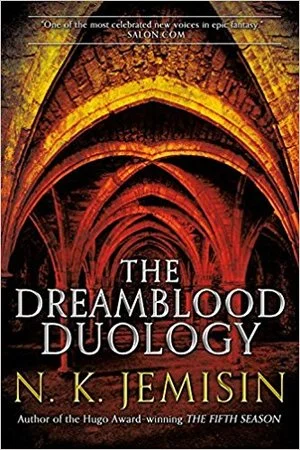Book Review: The Killing Moon / The Shadowed Sun
Full disclosure: after I read (and loved) The Fifth Season and The Obelisk Gate, I bought literally all of N.K. Jemisin's novels. I am an author loyalist, and as long as your works sit within my preferred genres, I will read everything.
So when they arrived, I went back and forth between the Inheritance trilogy and the Dreamblood Duology.* What decided me? Well, I love Egyptian...everything, so the fact that the Dreamblood books are loosely based on Egypt convinced me to pick those up first.
The Dreamblood books are set in the city of Gujaareh, a peaceful city which worships Hananja, goddess of dreams. The Killing Moon follows Ehiru, a priest of Hananja, and his apprentice Nijiri as they uncover a plot by Gujaareh's Prince to become a god. The Shadowed Sun, set years later, follows the Prince's son Wanahomen as he returns to rescue Gujaareh from its conquerors, with the help of Hanani, the priesthood's first female priest.
Everything I love about The Broken Earth books is on display here too. Jemisin is an absolute master of prose, and her descriptions in these books are nothing short of exquisite. We're talking achingly beautiful. The Killing Moon especially stood out in this regard.
Her magic system defies fantasy conventions in its originality. I love that it builds from dreams and the ancient four humor system. It's internally consistent, powerful without overwhelming the plot, and basically does everything one could ask a magic system to do. The Gatherers are my particular favorite: I love this concept that Gathering isn't murder, not really. That the peace it brings and the certainty of the afterlife justify it.
And the city itself is almost a character in its own right. Between the layering of classes, the shared religion and characteristics of Gujaareh's people, and the traditions that drift even through a simple conversation, Gujaareh feels alive in a way most writers just can't achieve. These books have such a palpable sense of atmosphere.
That's saying nothing of the actual characters. Jemisin has crafted four really lovely ones here: Ehiru and Nijiri and then Wana and Hanani. While I like the budding romance between Wana and Hanani, as well as Hanani's unique development as the only female priest of Hananja, it's Ehiru and Nijiri who stole the show for me. Ehiru is so beautifully tragic in his fall from grace and his acceptance of his eventual fate; likewise, Nijiri's love for his mentor will break your heart, and we see from the second book that he never really gets over it. These characters live and breathe like real people, and I can't give her higher praise than that.
The only place these books fall a little flat? The plot. It's not bad by any means in either book, but it does run a bit slow. The pacing is better in The Killing Moon; it runs a bit quicker, with better rise and fall between big events. The ultimate conflict is also on a much larger scale, with many thousands of lives threatened and an easily identifiable villain. The Shadowed Sun struggles a bit more; the Wild Dreamer is more tragic than anything else, and the arc of Wana's eventual return to Gujaareh moves at a snail's pace.
But even if they aren't as good as The Broken Earth books, the immersive worldbuilding and characters are worth your time if you're an avid fantasy reader. These books were the perfect bedtime reading for a few weeks, and I would recommend them both (though I'd recommend The Killing Moon a bit more).
*I reviewed these together because I have them in omnibus - and also because it just seemed fitting.
Grade: 4.25/5 for The Killing Moon, 4/5 for The Shadowed Sun
Memorable Quote:
“There was an edge to Nijiri’s voice, all of a sudden, that Ehiru had not expected. “I went with you, all those years ago, because I had already grown to understand it. You taught me my first lesson: that love means sacrifice. Making choices that are good for others, even at the cost of the self.” He ducked his eyes suddenly, radiating unhappiness. “I can do that.But I see no reason to do it unnecessarily.””







